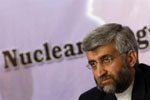 AFP: Iran and world powers Saturday failed to break the deadlock in the crisis over Tehran’s nuclear drive, with the EU foreign policy chief Catherine Ashton saying the positions were still “far apart”. By Dmitry Zaks and Farhad Pouladi
AFP: Iran and world powers Saturday failed to break the deadlock in the crisis over Tehran’s nuclear drive, with the EU foreign policy chief Catherine Ashton saying the positions were still “far apart”. By Dmitry Zaks and Farhad Pouladi
 ALMATY, Kazakhstan (AFP) — Iran and world powers Saturday failed to break the deadlock in the crisis over Tehran’s nuclear drive, with the EU foreign policy chief Catherine Ashton saying the positions were still “far apart”.
ALMATY, Kazakhstan (AFP) — Iran and world powers Saturday failed to break the deadlock in the crisis over Tehran’s nuclear drive, with the EU foreign policy chief Catherine Ashton saying the positions were still “far apart”.
After two days of exhausting diplomacy in the Kazakh city of Almaty, no new date was agreed for the resumption of talks searching for an elusive breakthrough after more than a decade of tensions.
Iran’s chief nuclear negotiator Saeed Jalili praised the talks as “comprehensive” but indicated that Tehran wanted to see more put on the table by the world powers to “gain the confidence” of the Iranian people.
The world powers had offered some easing of the sanctions that have hurt Iran’s economy in the past two years, in return for Tehran accepting limits on its nuclear programme.
But speaking after the talks wrapped up, Ashton admitted that the world powers were still waiting to see “real engagement” from Iran over their proposal.
“It became clear that the positions (of the world powers) and Iran remain far apart on the substance,” Ashton told reporters.
“It’s pretty obvious what we want to achieve in the end and we have very often spelled that out. The challenge is to get real engagement so that we can move forward with this.”
Russian Deputy Foreign Minister Sergei Ryabkov said the two sides had failed to find “mutual understanding”. He said the talks marked a step forwards but offered a “mixed picture”, Russian news agencies reported.
Unlike at the previous round of talks in Almaty in February which ended more cordially, the two sides did not agree a time and a place to hold the next meeting.
Instead, Ashton said the sides had decided to go back to their capitals to discuss what to do next and promised that she would be in touch with Jalili.
Ashton represents the world powers — comprised of the five permanent UN Security Council members and Germany and known collectively as the P5+1 — as chief negotiator.
Jalili offered little hope of Iran offering concessions on the main sticking point in the talks — Tehran’s insistence on its right to enrich uranium on its soil.
“Now they (the world powers) must work to gain the confidence of the Iranian people,” said Jalili, a hardline conservative close to Iran’s supreme leader Ayatollah Ali Khamenei.
“We believe that the right to enrich is an inalienable right of the Iranian people — whether we are talking about (to a level of) five percent or 20 percent,” Jalili said.
“Trust building should not deprive and deny the right of a nation but should be based on mutual cooperation,” he added.
The clock is running down on diplomacy to solve the crisis, with Iran’s archfoe Israel refusing to rule out air strikes against Iran to halt its nuclear drive.
However few analysts had expected an instant breakthrough in these talks, especially with Iran’s presidential elections looming in June and President Mahmoud Ahmadinejad stepping down after serving the maximum two terms.
Western officials had expressed puzzlement at Iran’s reaction after the first day of talks in Almaty, saying it had not put forward clear and concrete proposals.
Ashton started Saturday by meeting Jalili in the hope of establishing whether Tehran’s position had shifted from its tough demands of Friday.
Iran insists on international recognition of what it says is its “right” to enrich uranium, a key component of the nuclear fuel cycle which can also be used to make the explosive core of an atomic bomb.
But the world powers insist on Tehran ending enrichment to high levels and verifiably suspending operations at the Fordo mountain bunker where such activity takes place before recognising Iran’s rights to less threatening nuclear activities.
Iran has reportedly been offered the right to deal in some precious metals and perform small financial transactions now prohibited by the international sanctions. Tehran says it is being asked too much for too little in return.
Iran denies it is developing the atomic bomb and argues that it requires a nuclear programme solely for peaceful medical and energy needs.


